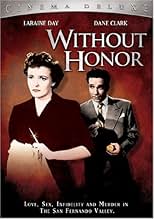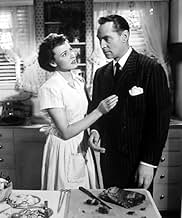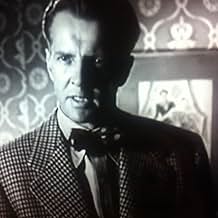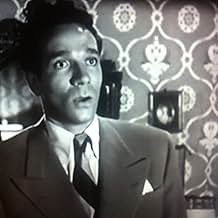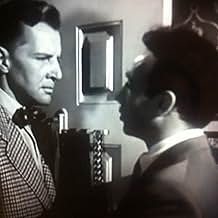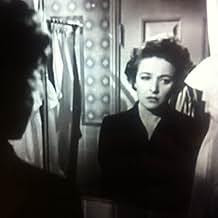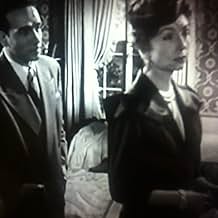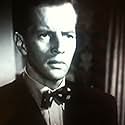Jane Bandle has recently married, but Bill, her husband's brother, tries to wreck her marriage because Jane rejected his sexual advances before her marriage.Jane Bandle has recently married, but Bill, her husband's brother, tries to wreck her marriage because Jane rejected his sexual advances before her marriage.Jane Bandle has recently married, but Bill, her husband's brother, tries to wreck her marriage because Jane rejected his sexual advances before her marriage.
- Awards
- 1 nomination total
Marjorie Stapp
- Neighbor's Wife
- (as Margie Stapp)
Irving Pichel
- Narrator
- (voice)
- (uncredited)
- Director
- Writer
- All cast & crew
- Production, box office & more at IMDbPro
Featured reviews
Watch carefully. Lorraine Day has very few lines in this movie. She did most of her acting by facial expressions responding to the other actor's long monologues (Clark & Moorehead). Pichel got the best out her.
I usually refrain from commenting on films because there are so many other reviewers out there...but seeing how this just has one review and a very negative, I felt I should offer my opinion.
I'll admit the first 20 or 30 minutes felt like a typical Hollywood pot-boiler. Cheating wife accidentally kills lover; will she get away with it; etc. After this set-up, the film becomes an onion - revealing new layers of characters' motivations and back-story.
Laraine Day stands out superbly as the cheating wife...whole scenes develop around her without her speaking, yet we know what's going on in her mind.
I have to agree with the other reviewer that I loved Steiner's score...but did feel it inappropriate at times. The performances on screen are very subtle and the music is anything but subtle.
I particularly enjoyed the second half of the film as characters acted against stereotypes.
The DVD I watched was from Geneon and featured an adequate transfer; not stellar, but much above average from the usual run-of-the-mill public domain stuff.
I'll admit the first 20 or 30 minutes felt like a typical Hollywood pot-boiler. Cheating wife accidentally kills lover; will she get away with it; etc. After this set-up, the film becomes an onion - revealing new layers of characters' motivations and back-story.
Laraine Day stands out superbly as the cheating wife...whole scenes develop around her without her speaking, yet we know what's going on in her mind.
I have to agree with the other reviewer that I loved Steiner's score...but did feel it inappropriate at times. The performances on screen are very subtle and the music is anything but subtle.
I particularly enjoyed the second half of the film as characters acted against stereotypes.
The DVD I watched was from Geneon and featured an adequate transfer; not stellar, but much above average from the usual run-of-the-mill public domain stuff.
Without Honor is a 1949 film directed by Irving Pichel and starring Laraine Day as an adulterous housewife in the Los Angeles burbs who has a sort of intervention conducted by her psychotic brother-in-law (Dane Clark) because he's getting even for spurning him and marrying his brother years before.
He arranges for Day and his brother (Bruce Bennett) to be home when Day's lover (Franchot Tone) and his wife (Agnes Moorehead) drop by so he can expose her and get his revenge. Just another sunny day in the burbs.
What Clark doesn't know is that earlier that afternoon Day and Tone had a big fight and break-up and when Day tried to kill herself with a shish-kabob skewer he accidentally fell on it while wrestling it away from her and stabbed himself to death. He's in the laundry room on the floor.
When Clark arrives, he taunts Day, who is about to skip out in a taxi. He goes on and on about how she got him drunk on beers when he was 18 and he made a fool of himself and he's never gotten over it. Day has other things on her mind. Moorehead shows up with no idea why she's there. Bennett comes home from work. Tone is a no-show.
Moorehead has a chat with Day and tells her she knows all about it ... and all his previous dalliances. Bennett pitches a fit, so Day runs into the bathroom and tries to slice her wrists with a razor blade. They call an ambulance but by then they discover that Tone isn't in the laundry room. Keep that ambulance a-comin'.
Everyone in the cast is quite good even if the film is a tad over-the-top. Certainly an interesting post-war take on placid suburbia. Gorgeous cars! Tone drives a 1948 Studebaker convertible and Moorehead drives a 1948 Packard sedan.
He arranges for Day and his brother (Bruce Bennett) to be home when Day's lover (Franchot Tone) and his wife (Agnes Moorehead) drop by so he can expose her and get his revenge. Just another sunny day in the burbs.
What Clark doesn't know is that earlier that afternoon Day and Tone had a big fight and break-up and when Day tried to kill herself with a shish-kabob skewer he accidentally fell on it while wrestling it away from her and stabbed himself to death. He's in the laundry room on the floor.
When Clark arrives, he taunts Day, who is about to skip out in a taxi. He goes on and on about how she got him drunk on beers when he was 18 and he made a fool of himself and he's never gotten over it. Day has other things on her mind. Moorehead shows up with no idea why she's there. Bennett comes home from work. Tone is a no-show.
Moorehead has a chat with Day and tells her she knows all about it ... and all his previous dalliances. Bennett pitches a fit, so Day runs into the bathroom and tries to slice her wrists with a razor blade. They call an ambulance but by then they discover that Tone isn't in the laundry room. Keep that ambulance a-comin'.
Everyone in the cast is quite good even if the film is a tad over-the-top. Certainly an interesting post-war take on placid suburbia. Gorgeous cars! Tone drives a 1948 Studebaker convertible and Moorehead drives a 1948 Packard sedan.
The problems that may be inherent in the story were made worse because the then-still-somewhat-powerful arbiters of censorship gave the film a rough time. The objection, I would assume, resulted from the fact that the Laraine Day character is allowed to live and not 'pay for her almost-fatal-act-of-murder'. Day didn't always get a chance to grab the parts that lead to awards, but she is more than good in this one. Sorry to contradict one of the earlier writers on the piece, but the worst acting in the film, and the only truly awful performance, is the one by Agnes Moorehead, wearing an outfit that could have come from Ed Wood. This is far from an unwatchable film... it does have suspense...and the ending is surprising in denouement. It is forgotten, I admit, but this film did earn considerable attention in the news regarding its producers' fights to get it released without disastrous cuts. Thus, a moment in the censorship issues that were finally blasted apart by people like Otto Preminger.
Without Honor is directed by Irving Pichel and written by James Pope. It stars Dane Clark, Laraine Day, Franchot Tone and Agnes Moorehead. Music is by Max Steiner and cinematography by Lionel Lindon.
A mixed bag on offer in this one, where a broth of "sins" is stirred suitably in predominantly one location. Set-up bares a striking resemblance to Hitchcock's Rope released the previous year, where a group of characters are thrust together in one living room deconstructing their sins, shattered dreams and ulterior motives - all while a supposed dead body lays prone in one of the bedrooms.
The thematics at work are prime film noir, adultery, suicide attempt, sexual aggression, jealous agenda, duping and etc, all of which only comes to life half way through the piece. Here in is the problem, the pic asks for a lot of patience from the viewer before really getting going, which although the character group dynamic is pungent with an unsavoury odour, it never fully gets out of first gear.
Things aren't helped by the flat visual look of the piece, where with the story set in daytime, we yearn for a bit of noir flourish from one of the ace noir photographers of the time. Then there's Steiner's score, which is a cracker, ebullience in abundance, only it's in the wrong film! Moorehead is wasted in what is ultimately a walk on passive role, but at least Clark and Day nail the traits of their respective characters.
No hidden gem here, and noir hunters should be advised this is only noir from a plot perspective, but enough damaged human conditioning here to make it above average. 6.5/10
A mixed bag on offer in this one, where a broth of "sins" is stirred suitably in predominantly one location. Set-up bares a striking resemblance to Hitchcock's Rope released the previous year, where a group of characters are thrust together in one living room deconstructing their sins, shattered dreams and ulterior motives - all while a supposed dead body lays prone in one of the bedrooms.
The thematics at work are prime film noir, adultery, suicide attempt, sexual aggression, jealous agenda, duping and etc, all of which only comes to life half way through the piece. Here in is the problem, the pic asks for a lot of patience from the viewer before really getting going, which although the character group dynamic is pungent with an unsavoury odour, it never fully gets out of first gear.
Things aren't helped by the flat visual look of the piece, where with the story set in daytime, we yearn for a bit of noir flourish from one of the ace noir photographers of the time. Then there's Steiner's score, which is a cracker, ebullience in abundance, only it's in the wrong film! Moorehead is wasted in what is ultimately a walk on passive role, but at least Clark and Day nail the traits of their respective characters.
No hidden gem here, and noir hunters should be advised this is only noir from a plot perspective, but enough damaged human conditioning here to make it above average. 6.5/10
Did you know
- TriviaThis film offers a rare glimpse at a contemporary 1949 television set, a bulky table model with a ten-inch rectangular screen, which commonly was required to be "set up" by qualified technicians who also needed to install an antenna on the roof before proper reception could be achieved. Commercial television broadcasts had begun in Los Angeles two years earlier in 1947 on KTLA (Channel 5).
- GoofsJane is said to have broken a heel In the fall that caused her to miss her escape by bus, but as she picks up a broken heel off the ground and carries it with her, the heels on the shoes on both her feet remain intact and attached.
- Quotes
Fred Bandle: [picking Jane up on the dusty road, oblivious to her foiled attempt at escape] Where were you? Out for a walk? You busted a heel, huh? Well you shouldn't wear heels on a street like this.
Details
- Runtime
- 1h 9m(69 min)
- Color
- Aspect ratio
- 1.37 : 1
Contribute to this page
Suggest an edit or add missing content

